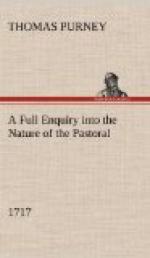SECT. II.
That no Language is so fit for Pastoral as the English.
I have before observed, that this softness is effected, among other things by little Words; yet I cannot help observing here, that our Language is infinitely the finest of any in the World for Pastoral, and it’s abounding so much in little Words is one Reason of it. The Pomps and Stateliness of the Latin Lines could not have been made proper for Pastoral, unless entirely alter’d, and ’tis not likely that a Genius daring enough to do that would engage in Pastoral.
The Romans had not a Particle, as we have, before their Substantives; As A and The Tree. Seldom used a Word before the Verbs; as He goes, They go. Nor had they our Doth and Does; without which no Englishman could form a Pastoral Language. As the sweet Simplicity of that Line, I have just quoted, is occasion’d by nothing else.
A Shepherd-boy (no better do him call.)
The Greek Language was greatly more fit for Pastoral than the Latin. Among other Reasons, because the former had so many Particles; and could render their Language uncommon, by their different Dialects, and by their various Methods of changing, and of compounding Words. Which no Language will admit of in an equal degree, besides the English. But then the Greek Language is too sonorous for Pastoral. Give me leave to show the inimitable softness and sweetness of the English Tongue, only by instancing in one Word. Which will also show how copious a Language ours is. I know but three Words the Greeks had to express the Word Lad or Swain by: [Greek: Agrikos, Poimruos; and Bokolos]; and how sonorous are they all. We have six; Swain, Boy, Shepherd, Youth, Stripling, Lad; and how inimitably soft is the sound of ’em all.
Theocritus has more Turns of Words or Phrazes than Spencer; yet he could in none of ’em come up to Spencer’s smoothness and simplicity in his Numbers. As I quoted only the Phrazes of my Country-men In the Chapter on that Head; I will here put down the finest in Theocritus, tho’ I cannot say indeed that he has any but in his first Pastoral.
[Greek: Archete boukolikas Moisai philai harchet haoithas. Thursis hod hox Ahitnas, kai Thursidos adea phona. Pa pok had esth, oka Daphnis etaketo, pa poka Numphai;]
The finest of these Lines (and the softest but one that I remember thro’ all his Pieces) is the middle one; it is most incorrigibly translated by Creech: tho’ I blame him not for it, because of the difficulty of inventing fine Phrazes, much more of translating those of other Men, into Rhime; for which Reason Creech has not attempted to give us any of Theocritus’s Turns of Words.




